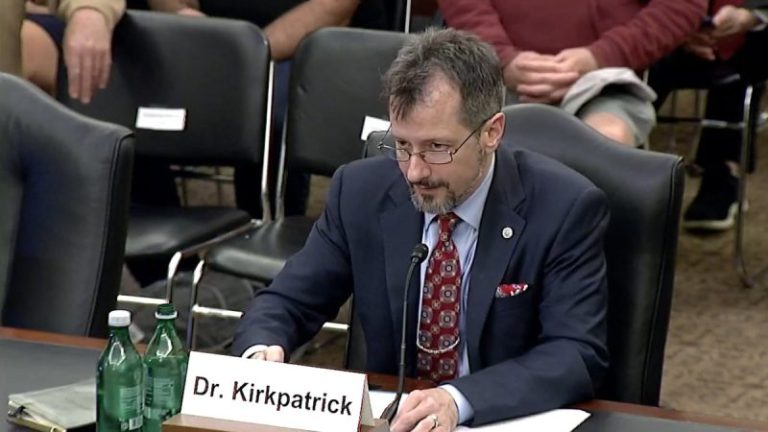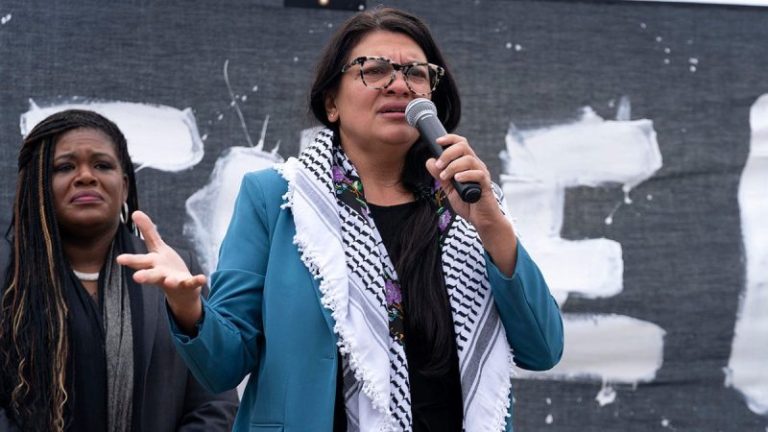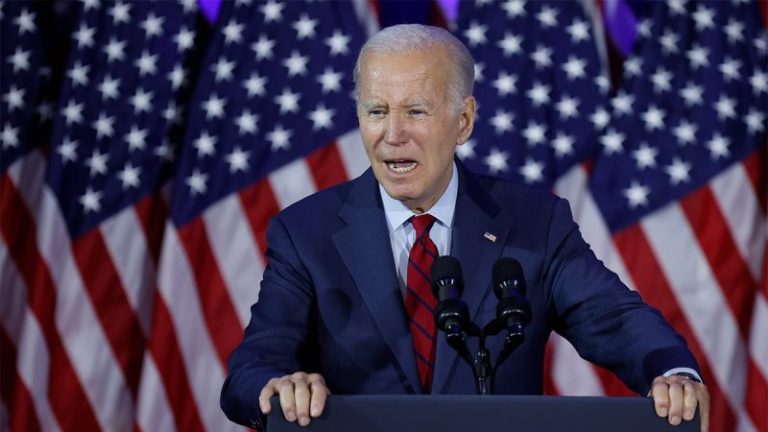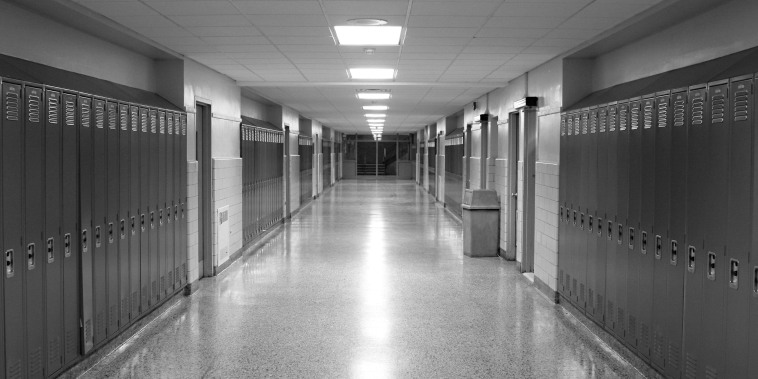Mass shootings, bullying, student mental health and the threat of gun violence have become increasingly bigger concerns at U.S. schools during the last two decades.
In the wake of the pandemic, which was both deeply damaging to students and forced many schools to employ new technology to teach students, more schools are turning to apps to address those problems.
A police officer speaks to eighth grade students about internet safety and cyberbullying in Stamford, Conn., last year.John Moore / Getty Images file
“Technology companies during the pandemic really took a rise of presenting themselves as an app-based solution for problems in schools,” said Alexis Hancock of the Electronic Frontier Foundation.
That’s perhaps expected — who doesn’t love high-tech solutions to everything? — and surprising, in that thousands of schools are telling students and parents to download and use these apps.
The notion of apps to address problems ranging from cyberbullying to mental health crises to shootings isn’t new. And Corporate America is exploring this path, too. But inside the tech departments at various schools, things seem to be taking off.
Craig Hansen said he recognized during the pandemic that students were struggling more than ever. Along with experiencing the trauma of the pandemic, they were suffering from a long period of isolation from their peers and had been deprived of a lot of their normal activities. And they still had the normal pressures of school to contend with. So he wanted to find a way to help. Hansen is the chief emergency officer for Questar III BOCES, a school that also provides educational and administrative services to districts in New York’s Hudson Valley.
“We knew it would be a good opportunity to try to get a grant to help support our schools in this realm knowing the mental health strains and stressors that we were seeing,” he told NBC News.
Companies including STOPit Solutions, Raptor Technologies, Navigate360, Anonymous Alerts, and Sandy Hook Promise offer apps with a wide variety of safety and monitoring features such as anonymous threat reporting, tracking of visitors to schools, silent alarms and communication with police and mental health counselors. Several states have developed their own reporting systems with similar features.
The companies say they are giving schools and students tools that can prevent a tragedy. What’s certain is that they’re becoming widespread.
Hansen said he applied for a Justice Department grant and received funding to pay for a program that would help address the problems students were having. He considered a handful of options and chose STOPit Solutions because it has a 24-hour monitoring center where reports are evaluated. Fifteen area school districts joined his application, which was ultimately accepted. They are now starting to use the system.
“It’s another tool that will allow students and families to report something and give kids the help that they need,” he told NBC News.
STOPit Solutions, a privately-held company that has been around since 2013, says its app is now being used by 8,800 schools in every U.S. state.
“We give kids a simple fast and powerful way to reach out when they’re in distress, and that can be an external threat, a threat on campus, or an internal threat to oneself, which is more commonly the case these days,” CEO C. Parkhill Mays III said.
Mays says the company gets 300 to 500 reports from students every night, and about 10.5% of those constitute an imminent threat in which police or mental health professionals are brought in.
It’s going to take more than just an app
When it comes to the nightmare scenario of school shootings, unspoken in all of this is the following: Parents and school administrators can’t do much about U.S. gun policies or the state of the health care system in the immediate future, and both of those are both often cited as factors in these issues.
Students hug at a memorial Dec. 1, 2021, following a shooting at Oxford High School in Oxford, Mich.Paul Sancya / AP
But many school officials say they have to do something. And in many cases, they’re required to act. A handful of states around the country have passed versions of Alyssa’s Law, which require schools to have silent panic alarms in case of an emergency.
Craig Hansen said he sought the grant that funded the STOPit app in the Hudson schools because New York state was about to pass that law.
In that context, something like an app that could report a dangerous situation or person looks that much more helpful.
Still, experts said, apps like these could be a double-edged sword. While they could really help students going through a crisis, they have to be implemented carefully — particularly when it comes to potential school violence. They raised concerns about whether students would use these reporting tools to harass their peers, for example.
Mays said that kind of behavior is rare, as less than 1% of reports that go through his company’s app are a result of users abusing the platform. He added that school administrators can block students who misuse the app.
Hancock, of the Electronic Frontier Foundation, said that before a school partners with a reporting app like these, it needs to create procedures that will dictate how different kinds of reports will be handled, what kinds of in-person interventions are done, and when parents or authorities are contacted, among other things.
Without that, she says, even a well-designed app won’t do much good.
“If you don’t have an outlined offline protocol, this tool will be effectively useless,” Hancock said.
The experts NBC News spoke to agreed that children who seem suicidal require immediate help, and that an app where students can report that they or their peers are struggling has obvious benefits — and that counselors and regular screenings and check-ins are needed, as well.
Devorah Heitner, author of “Growing Up in Public: Coming of Age in a Digital World,” said that giving schools more resources to address students’ mental health problems would help more than an app.
She said there have been plenty of cases where students have reported that they were worried that a fellow student was going to bring a gun to school — only for no one to act on that report, with tragic results. In some cases, she added, future school shooters have even reported themselves but not received help.
“It’s good to be doing schoolwide mental health screenings on kids and then taking seriously what kids say about how they’re doing,” Heitner said. “I think we need more counselors than cops in schools.”
Pushing for peer intervention
In its introductory materials, STOPit Solutions tells students that they have to take it upon themselves to get involved and report behavior that might be a warning sign for violence, such as unusual and concerning actions or statements.
“Eighty percent of mass shootings are preventable due to the presence of early warning threat indicators,” STOPit national trainer Martoinne Williams says in a student training video. He says it’s especially important for students to monitor social media for those signs.
“Adults are not spending that much time on social media, so that means you are the eyes and the ears on social media,” he says. He advises them to take screenshots and gather specific information about the time and place that any violent incident might occur, and report it to schools through the app.
“It’s like asking children to be their own private investigators to bullying campaigns, and that’s not an approach I would want any child to take,” Hancock said. “If we were actually to address this, it has to be through a multifaceted solution, not a singular app asking students to become police.”
Austin Crosier, Hudson City School District communications specialist, said that for his district, STOPit is part of a broader emphasis on health and safety.
“We have and always will encourage students and staff if they see/hear something concerning or are dealing with an issue, to say something and get ahead of the situation before it escalates. All administrators, guidance counselors, building psychologists, nurses and staff are willing and ready to assist however they can and will treat every case individually with the utmost care and importance,” he wrote in an email to NBC News.
Still, experts who spoke to NBC News said there were downsides to the idea of addressing bullying through reports and apps.
The idea of getting bystanders to intervene in bullying situations has become a popular one, said Izzy Kalman, a school psychiatrist and author. But he says there is little evidence showing that it helps.
Kalman told NBC News that since the Columbine High School shooting in 1999, schools have taken overly active approaches to stamping out bullying, including asking students to report all manner of incidents. In his view, it doesn’t work, and might be making things worse. He points out that there is nothing more upsetting to a child than being “told on,” so getting administrators involved becomes part of a cycle of punishment and revenge.
“People get defensive when reported,” he said. “They want to get back and it escalates and it leads to physical harm.”
There are unquestionably times when children need to get an authority figure involved, Kalman says. Especially if someone is hurt or a crime is committed, or someone is in danger.
But in other situations, he says, schools should be teaching children how to solve their own problems and develop relationships instead of telling them to report one another to authority figures.
Juliette Pennyman, superintendent of the Hudson City School District, which started using STOPit on Nov. 1, had a different perspective. She said that using the app to report potential problems will ultimately make students feel more connected.
“I think it will help the culture of transparency and wanting to keep everyone safe, and students caring about each other, and they know that they won’t feel like they’re telling on a friend if a friend is in distress of any kind,” she said.
This post appeared first on NBC NEWS










